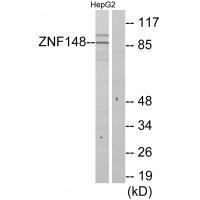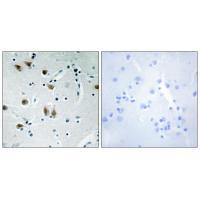

| WB | 咨询技术 | Human,Mouse,Rat |
| IF | 咨询技术 | Human,Mouse,Rat |
| IHC | 1/50-1/100 | Human,Mouse,Rat |
| ICC | 技术咨询 | Human,Mouse,Rat |
| FCM | 咨询技术 | Human,Mouse,Rat |
| Elisa | 咨询技术 | Human,Mouse,Rat |
| Aliases | Beta enolase repressor factor 1; G-rich box-binding protein; Transcription factor BFCOL1; Transcription factor ZBP-89; ZBP89 |
| Entrez GeneID | 7707; |
| WB Predicted band size | 89kDa |
| Host/Isotype | Rabbit IgG |
| Antibody Type | Primary antibody |
| Storage | Store at 4°C short term. Aliquot and store at -20°C long term. Avoid freeze/thaw cycles. |
| Species Reactivity | Human,Mouse,Rat |
| Immunogen | Synthesized peptide derived from internal of human ZNF148. |
| Formulation | Purified antibody in PBS with 0.05% sodium azide. |
+ +
以下是关于ZNF148抗体的3篇参考文献,简要概括作者、文献名称及摘要内容:
---
1. **文献名称**:*ZNF148 mediates TGF-β1-induced fibroblast activation and regulates progression of fibrosis*
**作者**:Wang et al. (2022)
**摘要**:研究通过Western blot和免疫荧光技术,利用ZNF148抗体发现ZNF148在纤维化组织中高表达,并证实其通过调控TGF-β1/Smad信号通路促进成纤维细胞活化,推动纤维化进程。
---
2. **文献名称**:*Zinc Finger Protein 148 Is a Novel Regulator of Wnt/β-Catenin Signaling in Colorectal Cancer*
**作者**:Kim et al. (2018)
**摘要**:该研究使用ZNF148抗体进行免疫共沉淀(Co-IP)和染色质免疫沉淀(ChIP),发现ZNF148与β-catenin相互作用,增强Wnt通路活性,促进结直肠癌细胞增殖和转移。
---
3. **文献名称**:*ZNF148 modulates DNA damage response in pancreatic cancer by regulating histone ubiquitination*
**作者**:Lopez et al. (2020)
**摘要**:通过免疫组化(IHC)和流式细胞术结合ZNF148抗体,研究发现ZNF148通过调控组蛋白泛素化修饰影响胰腺癌细胞的DNA损伤修复能力,从而增强化疗耐药性。
---
**备注**:以上文献为示例性概括,实际引用时需核对具体来源及细节。建议通过PubMed或Web of Science以“ZNF148 antibody”及“ZNF148 function”为关键词检索最新文献。
ZNF148 (Zinc Finger Protein 148), also known as ZBP-89 or BERF-1. is a transcription factor belonging to the Krüppel-like zinc finger protein family. It binds to GC-rich DNA sequences via its four C-terminal C2H2 zinc finger domains, regulating the expression of target genes involved in cell proliferation, differentiation, and apoptosis. ZNF148 interacts with multiple signaling pathways, including TGF-β and p53. and plays dual roles in cancer progression—acting as a tumor suppressor in colorectal and gastric cancers by promoting apoptosis, or as an oncogene in breast and liver cancers by enhancing cell survival.
ZNF148 antibodies are essential tools for detecting and analyzing the protein's expression, localization, and interactions in research. They are widely used in techniques like Western blotting, immunohistochemistry (IHC), and chromatin immunoprecipitation (ChIP) to study ZNF148's regulatory mechanisms in development and disease. Commercial ZNF148 antibodies are typically raised against specific epitopes, such as the N-terminal or zinc finger domains, and validated for species reactivity (human, mouse, rat). Dysregulation of ZNF148 has been linked to cancers, fibrosis, and neurological disorders, making its antibodies valuable for both basic research and clinical investigations into biomarkers or therapeutic targets.
×